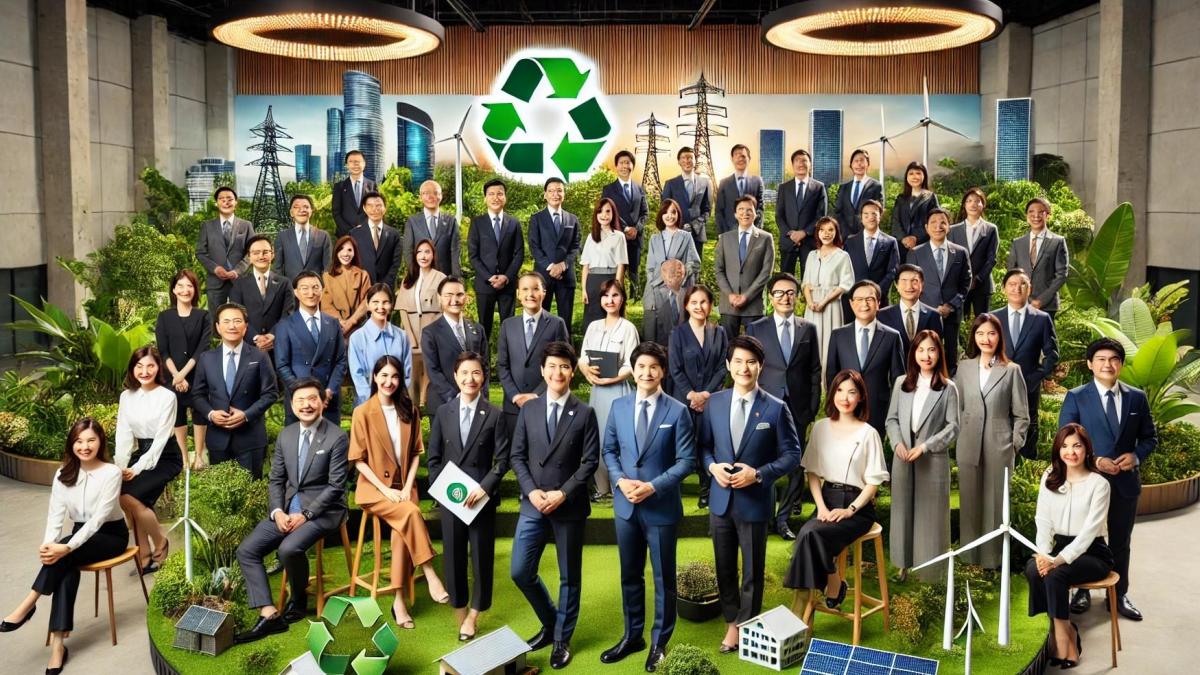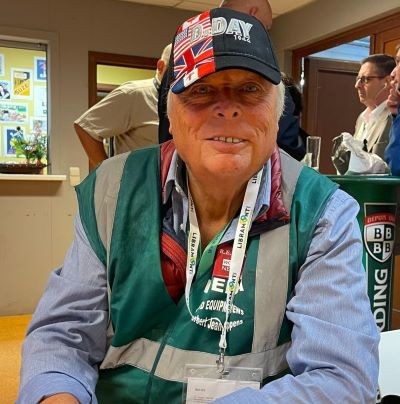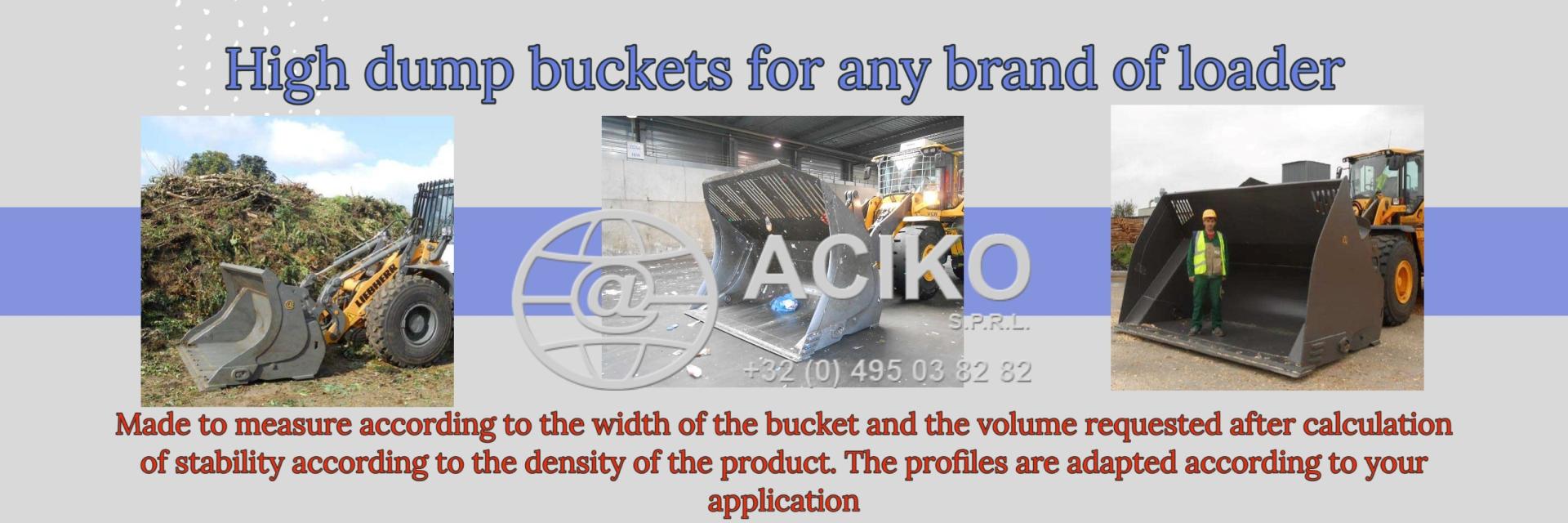Thai Cement Manufacturers Association Pioneering Sustainability
 08/01/25-FR-English-NL-footer
08/01/25-FR-English-NL-footer
L'Association thaïlandaise des fabricants de ciment, pionnière en matière de développement durable
 Image-R.E.News
Image-R.E.News
L'Association thaïlandaise des fabricants de ciment (TCMA) a fait la une des journaux à la COP29 avec ses progrès révolutionnaires dans le cadre de l'initiative Saraburi Sandbox.
Ce projet est devenu la pierre angulaire des efforts de la Thaïlande pour atteindre ses ambitieux objectifs de zéro émission nette en 2050. Organisée à Bakou, en Azerbaïdjan, à partir de novembre 2024, la COP29 s'articulait autour du thème « En solidarité pour un monde vert », mettant en valeur les engagements mondiaux en faveur du développement durable.
Pour la Thaïlande, le Saraburi Sandbox est un brillant exemple d'intégration de la politique, de la technologie, du financement et de la gouvernance pour débloquer des opportunités de financement vert.
Au Pavillon de la Thaïlande, la TCMA a mis en avant les réalisations d'un an du Saraburi Sandbox, consolidant son rôle de plateforme transformatrice pour les pratiques industrielles à faible émission de carbone. En collaboration avec le Département du changement climatique et de l'environnement (DCCE), la Global Cement and Concrete Association (GCCA) et l'ONUDI, la TCMA a partagé les leçons apprises et les stratégies pour faire évoluer les innovations durables.
Le Dr Chana Poomee, président de la TCMA, a souligné l’engagement de l’association à participer à la COP, en déclarant : « Avoir un plan clair, une coopération multisectorielle et les bons partenariats, ainsi qu’une vision internationale et un engagement local, sont essentiels pour conduire le changement. » Ce sentiment sous-tend le succès du Saraburi Sandbox, qui vise à positionner l’industrie cimentière thaïlandaise comme un leader en matière de développement durable.
Au cours de l’année écoulée, le Saraburi Sandbox a produit des résultats impressionnants grâce à un modèle de partenariat public-privé-population (PPP). Les points forts comprennent :
Adoption du ciment hydraulique : Plus de 80 % des projets de construction à Saraburi utilisent désormais du ciment hydraulique, réduisant ainsi les émissions de carbone.
Carburants alternatifs et énergies renouvelables : L’industrie du ciment a augmenté son utilisation de carburants alternatifs et d’énergies renouvelables à 26 %, créant un précédent pour une fabrication plus écologique.
Les cultures énergétiques comme carburant : Un projet pilote de culture de l’herbe Napier comme source de carburant alternative a gagné du terrain.
Installation d’un abri solaire pour voitures : la mairie de Saraburi dispose désormais d’un abri solaire pour voitures avec un système d’énergie renouvelable, ce qui témoigne de l’engagement de la municipalité en faveur de l’énergie propre.
Gestion communautaire des déchets : les organisations administratives locales ont été les fers de lance d’initiatives de gestion des déchets, promouvant les pratiques d’économie circulaire.
Expansion de la forêt communautaire : des espaces verts ont été étendus sur 38 sites, améliorant la biodiversité et la séquestration du carbone.
Le bac à sable de Saraburi a attiré l’attention du monde entier, favorisant des collaborations qui amplifient son impact. L’université de Princeton a mené une étude sur le potentiel d’énergie renouvelable de la province, fournissant des informations basées sur des données pour éclairer les projets futurs. Parallèlement, la GCCA a facilité le partage des connaissances et l’alignement des politiques, permettant la réplication d’initiatives réussies à l’échelle internationale.
M. Thomas Guillot, directeur général de la GCCA, a salué le leadership de la TCMA, déclarant : « Ce que font la TCMA et les membres des producteurs de ciment thaïlandais est incroyable et inspirant. Le bac à sable de Saraburi démontre le rôle pionnier de la TCMA, et la GCCA est fière de soutenir ces efforts avec des objectifs clairs. »
L’obtention d’un financement vert reste un objectif essentiel pour la TCMA. Le Saraburi Sandbox s’est positionné comme un pôle d’attraction pour les investissements internationaux, en s’alignant sur la feuille de route de la Thaïlande pour un ciment et un béton à zéro émission nette d’ici 2050. L’ONUDI a joué un rôle central en mettant en relation le TCMA avec des sources de financement essentielles, garantissant ainsi l’évolutivité et la longévité de l’initiative.
Le Dr Chana a souligné l’urgence d’accélérer la collaboration multilatérale, déclarant : « La Thaïlande doit harmoniser les politiques gouvernementales, éliminer les obstacles réglementaires et mettre en œuvre des projets à faible émission de carbone avec la participation du secteur privé. Le soutien des organisations internationales à la technologie et au financement est essentiel pour conduire une transition durable et compétitive. »
Si le Saraburi Sandbox a fait des progrès remarquables, des défis persistent. Les obstacles réglementaires et la nécessité d’un engagement communautaire plus large mettent en évidence les domaines nécessitant une attention immédiate. Cependant, ces défis offrent également des opportunités d’innover et de renforcer les partenariats.
En intégrant les meilleures pratiques mondiales et en tirant parti des technologies de pointe, la Thaïlande peut surmonter ces obstacles efficacement. Le Saraburi Sandbox sert de modèle à d’autres régions, démontrant comment les efforts de collaboration peuvent produire des résultats tangibles dans la lutte contre le changement climatique.
Alors que le monde s’efforce d’atteindre les objectifs de zéro émission nette, le Saraburi Sandbox illustre le pouvoir de l’action collective. Son succès repose sur son approche holistique, qui associe initiatives locales et expertise internationale pour créer un modèle évolutif et efficace en matière de développement durable.
L’engagement de la Thaïlande en faveur de la vision Net Zero 2050 est évident dans des projets comme le Saraburi Sandbox. Avec un soutien et une innovation continus, cette initiative devrait générer des progrès significatifs, non seulement pour l’industrie du ciment, mais aussi pour les objectifs plus larges de durabilité du pays.
NJC.© Info Thai Cement Manufacturers Association (TCMA)
----------------------------------------------------------------------------------------------------------------
 08/01/25-English
08/01/25-English
Thai Cement Manufacturers Association Pioneering Sustainability
 Image-R.E.News
Image-R.E.News
The Thai Cement Manufacturers Association (TCMA) made headlines at COP29 with its ground-breaking progress in the Saraburi Sandbox initiative.
This project has become a cornerstone of Thailand’s efforts to meet its ambitious Net Zero 2050 goals. Held in Baku, Azerbaijan, from November 11–22, 2024, COP29 revolved around the theme “In Solidarity for a Green World,” showcasing global commitments to sustainable development.
For Thailand, the Saraburi Sandbox serves as a shining example of integrating policy, technology, funding, and governance to unlock green financing opportunities.
At the Thailand Pavilion, TCMA highlighted the one-year achievements of the Saraburi Sandbox, cementing its role as a transformative platform for low-carbon industrial practices. In collaboration with the Department of Climate Change and Environment (DCCE), the Global Cement and Concrete Association (GCCA), and UNIDO, TCMA shared lessons learned and strategies for scaling sustainable innovations.
Dr. Chana Poomee, Chairman of TCMA, remarked on the association’s dedication to COP participation, stating: “Having a clear plan, multi-sector cooperation, and the right partnerships, together with international vision and local commitment, are essential to drive change.” This sentiment underpins the success of the Saraburi Sandbox, which aims to position Thailand’s cement industry as a leader in sustainability.
Over the past year, the Saraburi Sandbox has delivered impressive results through a Public-Private-People Partnership (PPP) model. Highlights include:
Hydraulic Cement Adoption: Over 80% of construction projects in Saraburi now utilise hydraulic cement, reducing carbon emissions.
Alternative Fuels and Renewable Energy: The cement industry has increased its use of alternative fuels and renewable energy to 26%, setting a precedent for greener manufacturing.
Energy Crops as Fuel: A pilot project cultivating Napier grass as an alternative fuel source has gained traction.
Solar Carport Installation: Saraburi City Hall now boasts a solar carport with a renewable energy system, showcasing municipal commitment to clean energy.
Community Waste Management: Local administrative organisations have spearheaded waste management initiatives, promoting circular economy practices.
Community Forest Expansion: Green areas have been extended across 38 locations, enhancing biodiversity and carbon sequestration.
The Saraburi Sandbox has attracted global attention, fostering collaborations that amplify its impact. Princeton University conducted a study on the province’s renewable energy potential, providing data-driven insights to inform future projects. Meanwhile, GCCA has facilitated knowledge sharing and policy alignment, enabling replication of successful initiatives on an international scale.
Mr. Thomas Guillot, Chief Executive of GCCA, praised TCMA’s leadership, stating: “What TCMA and members of Thai cement producers do is incredible and inspiring. The Saraburi Sandbox demonstrates TCMA’s pioneering role, and GCCA is proud to support these efforts with clear targets.”
Securing green funding remains a critical focus for TCMA. The Saraburi Sandbox has positioned itself as a magnet for international investments, aligning with the Thailand 2050 Net Zero Cement and Concrete Roadmap. UNIDO has played a pivotal role by connecting TCMA with essential funding sources, ensuring the initiative’s scalability and longevity.
Dr. Chana underscored the urgency of accelerating multilateral collaboration, stating: “Thailand must harmonise government policies, eliminate regulatory barriers, and implement low-carbon projects with private sector involvement. International organisations’ support for technology and funding is vital for driving a sustainable, competitive transition.”
While the Saraburi Sandbox has made remarkable strides, challenges persist. Regulatory hurdles and the need for broader community engagement highlight areas requiring immediate attention. However, these challenges also present opportunities to innovate and strengthen partnerships.
By integrating global best practices and leveraging advanced technologies, Thailand can address these obstacles effectively. The Saraburi Sandbox serves as a model for other regions, demonstrating how collaborative efforts can yield tangible results in the fight against climate change.
As the world races to achieve net zero targets, the Saraburi Sandbox exemplifies the power of collective action. Its success lies in its holistic approach, blending local initiatives with international expertise to create a scalable, impactful model for sustainability.
Thailand’s commitment to the Net Zero 2050 vision is evident in projects like the Saraburi Sandbox. With continued support and innovation, this initiative is set to drive significant progress, not just for the cement industry, but for the nation’s broader sustainability goals.
NJC.© Info Thai Cement Manufacturers Association (TCMA)
-------------------------------------------------------------------------------------------------------------------
 08/01/25-NL
08/01/25-NL
Thai Cement Manufacturers Association pioniert op het gebied van duurzaamheid
 Image-R.E.News
Image-R.E.News
De Thai Cement Manufacturers Association (TCMA) haalde de krantenkoppen op COP29 met zijn baanbrekende vooruitgang in het Saraburi Sandbox-initiatief.
Dit project is een hoeksteen geworden van Thailands inspanningen om zijn ambitieuze Net Zero 2050-doelen te behalen. COP29, dat van november 2024 in Bakoe, Azerbeidzjan werd gehouden, draaide om het thema "In solidariteit voor een groene wereld", waarbij wereldwijde toezeggingen voor duurzame ontwikkeling werden getoond.
Voor Thailand is de Saraburi Sandbox een schitterend voorbeeld van het integreren van beleid, technologie, financiering en bestuur om groene financieringsmogelijkheden te ontsluiten.
In het Thailand Pavilion benadrukte TCMA de prestaties van de Saraburi Sandbox in één jaar, waarmee de rol ervan als transformatief platform voor koolstofarme industriële praktijken werd verstevigd. In samenwerking met het Department of Climate Change and Environment (DCCE), de Global Cement and Concrete Association (GCCA) en UNIDO deelde TCMA geleerde lessen en strategieën voor het opschalen van duurzame innovaties.
Dr. Chana Poomee, voorzitter van TCMA, merkte op over de toewijding van de vereniging aan COP-deelname en stelde: "Een duidelijk plan, multisectorale samenwerking en de juiste partnerschappen, samen met een internationale visie en lokale betrokkenheid, zijn essentieel om verandering teweeg te brengen." Dit sentiment onderstreept het succes van de Saraburi Sandbox, die de Thaise cementindustrie wil positioneren als leider in duurzaamheid.
Het afgelopen jaar heeft de Saraburi Sandbox indrukwekkende resultaten opgeleverd via een Public-Private-People Partnership (PPP)-model. Hoogtepunten zijn onder meer:
Aanname van hydraulisch cement: meer dan 80% van de bouwprojecten in Saraburi maakt nu gebruik van hydraulisch cement, waardoor de CO2-uitstoot wordt verminderd.
Alternatieve brandstoffen en hernieuwbare energie: de cementindustrie heeft het gebruik van alternatieve brandstoffen en hernieuwbare energie verhoogd tot 26%, wat een precedent schept voor groenere productie.
Energiegewassen als brandstof: een pilotproject voor het verbouwen van Napier-gras als alternatieve brandstofbron heeft aan populariteit gewonnen.
Installatie van zonnecarport: Het stadhuis van Saraburi heeft nu een zonnecarport met een systeem voor hernieuwbare energie, wat de inzet van de gemeente voor schone energie laat zien.
Afvalbeheer van de gemeenschap: Lokale bestuurlijke organisaties hebben initiatieven voor afvalbeheer geleid en circulaire economiepraktijken gepromoot.
Uitbreiding van het gemeenschappelijk bos: Groene gebieden zijn uitgebreid naar 38 locaties, wat de biodiversiteit en koolstofvastlegging verbetert.
De Saraburi Sandbox heeft wereldwijd de aandacht getrokken en samenwerkingen bevorderd die de impact ervan vergroten. Princeton University heeft een onderzoek uitgevoerd naar het potentieel van hernieuwbare energie van de provincie, wat inzichten op basis van data heeft opgeleverd om toekomstige projecten te informeren. Ondertussen heeft GCCA kennisdeling en beleidsafstemming gefaciliteerd, waardoor succesvolle initiatieven op internationale schaal kunnen worden gerepliceerd.
Dhr. Thomas Guillot, Chief Executive van GCCA, prees het leiderschap van TCMA en zei: "Wat TCMA en leden van Thaise cementproducenten doen, is ongelooflijk en inspirerend. De Saraburi Sandbox toont de pioniersrol van TCMA en GCCA is er trots op deze inspanningen te ondersteunen met duidelijke doelstellingen."
Het veiligstellen van groene financiering blijft een cruciaal aandachtspunt voor TCMA. De Saraburi Sandbox heeft zichzelf gepositioneerd als een magneet voor internationale investeringen, in lijn met de Thailand 2050 Net Zero Cement and Concrete Roadmap. UNIDO heeft een cruciale rol gespeeld door TCMA te verbinden met essentiële financieringsbronnen, waardoor de schaalbaarheid en levensduur van het initiatief werd gewaarborgd.
Dr. Chana benadrukte de urgentie van het versnellen van multilaterale samenwerking en stelde: "Thailand moet overheidsbeleid harmoniseren, regelgevende belemmeringen wegnemen en koolstofarme projecten implementeren met betrokkenheid van de particuliere sector. De steun van internationale organisaties voor technologie en financiering is van vitaal belang voor het aanjagen van een duurzame, concurrerende transitie."
Hoewel de Saraburi Sandbox opmerkelijke stappen heeft gezet, blijven er uitdagingen bestaan. Regelgevende hindernissen en de noodzaak van bredere betrokkenheid van de gemeenschap benadrukken gebieden die onmiddellijke aandacht vereisen. Deze uitdagingen bieden echter ook kansen om te innoveren en partnerschappen te versterken.
Door wereldwijde best practices te integreren en geavanceerde technologieën te benutten, kan Thailand deze obstakels effectief aanpakken. De Saraburi Sandbox dient als model voor andere regio's en laat zien hoe gezamenlijke inspanningen tastbare resultaten kunnen opleveren in de strijd tegen klimaatverandering.
Terwijl de wereld racet om netto nuldoelen te behalen, is de Saraburi Sandbox een voorbeeld van de kracht van collectieve actie. Het succes ervan ligt in de holistische aanpak, waarbij lokale initiatieven worden gecombineerd met internationale expertise om een schaalbaar, impactvol model voor duurzaamheid te creëren.
Thailand’s commitment to the Net Zero 2050 vision is evident in projects like the Saraburi Sandbox. With continued support and innovation, this initiative is set to drive significant progress, not just for the cement industry, but for the nation’s broader sustainability goals.
NJC.© Info Thai Cement Manufacturers Association (TCMA)
-----------------------------------------------------------------------------------------------------------------
Date de dernière mise à jour : 07/01/2025

















